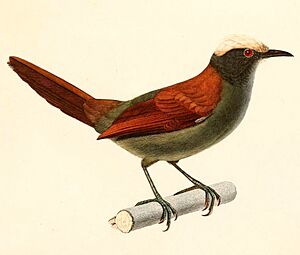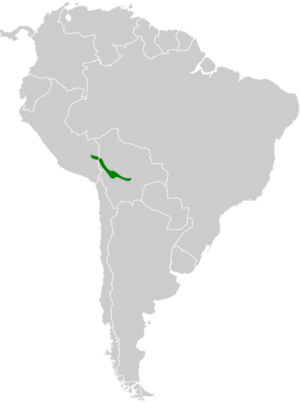Light-crowned spinetail facts for kids
Quick facts for kids Light-crowned spinetail |
|
|---|---|
 |
|
| Conservation status | |
| Scientific classification |
|
| Kingdom: | Animalia |
| Phylum: | Chordata |
| Class: | Aves |
| Order: | Passeriformes |
| Family: | Furnariidae |
| Genus: | Cranioleuca |
| Species: |
C. albiceps
|
| Binomial name | |
| Cranioleuca albiceps (D'Orbigny & Lafresnaye, 1837)
|
|
 |
|
| Script error: The function "autoWithCaption" does not exist. | |
Script error: No such module "Check for conflicting parameters".
The light-crowned spinetail (Cranioleuca albiceps) is a small bird that belongs to the ovenbird family, called Furnariidae. You can find this bird living in the countries of Bolivia and Peru.
Contents
About the Light-Crowned Spinetail
What is a Light-Crowned Spinetail?
The light-crowned spinetail is closely related to two other birds: the Marcapata spinetail and the Vilcabamba spinetail. Scientists call these "sister species" because they share a common ancestor.
Types of Light-Crowned Spinetails
There are two main types, or subspecies, of the light-crowned spinetail:
- C. a. albiceps - This one was first described by D'Orbigny and Lafresnaye in 1837.
- C. a. discolor - This one was described by John T. Zimmer in 1935.
What Does the Light-Crowned Spinetail Look Like?
The light-crowned spinetail is about 14 to 15 cm (5.5 to 5.9 in) long. It weighs between 13 and 17 g (0.46 and 0.60 oz). Both male and female birds look the same.
Colors and Markings
- Face: They have a dark gray-brown stripe above their eye, with a thin black line above that. Their face is mostly dark grayish brown.
- Head: The front of their head is a light, yellowish-brown color. The top of their head can be white, yellowish, or reddish-brown.
- Neck: They have a dark brownish "collar" around the back and sides of their neck.
- Body: Their back is a reddish-chestnut color. This color becomes duller and browner towards their tail.
- Tail: Their tail is reddish-chestnut. The feathers are pointed and look a bit spiny at the ends.
- Wings: Their wings are reddish-chestnut, with dark tips on the flight feathers.
- Underparts: Their throat is grayish-white. Their chest and belly are an olive-brown color.
Other Features
- Eyes: Their eyes are dark red to reddish-brown.
- Beak: The upper part of their beak (maxilla) is blackish. The lower part (mandible) is silvery-horn to bluish-gray, sometimes with a dark tip.
- Legs and Feet: Their legs and feet are greenish-gray to dull olive-green.
Differences in Subspecies
The C. a. discolor subspecies has a more yellowish to deep yellowish-brown crown. Its throat and chest are also grayer compared to the other subspecies.
Where Do Light-Crowned Spinetails Live?
Geographic Range
The C. a. albiceps subspecies lives in the Andes mountains. You can find it in southern Department of Puno in Peru. It also lives in northern Bolivia, specifically in the La Paz and Cochabamba areas.
The C. a. discolor subspecies is found in the central Andes of Bolivia. Its range extends from Cochabamba into the western Santa Cruz Department.
Habitat and Elevation
These birds live in montane evergreen forests. They especially like areas where Chusquea bamboo grows. They can be found at elevations from 2,200 to 3,400 meters (7,200 to 11,200 ft) above sea level.
How Light-Crowned Spinetails Behave
Movement and Migration
The light-crowned spinetail stays in the same area all year round. It does not migrate to different places.
What Do They Eat?
The light-crowned spinetail eats arthropods, which are small creatures like insects and spiders. They often hunt for food in pairs. Sometimes, they join groups of different bird species that are foraging together.
They usually look for food in the middle layers of the forest and at the forest edges. They are very agile and pick their prey from tree bark and leaves, both living and dead. They often move along branches and sometimes even tree trunks while searching.
Reproduction and Life Cycle
Scientists believe that light-crowned spinetails are monogamous. This means a male and female bird stay together to raise their young.
Their nest is shaped like an oval and is made mostly of moss. It has an entrance on the side. They build these nests wrapped around a Chusquea bamboo branch. Not much else is known about how they raise their young.
What Do They Sound Like?
The light-crowned spinetail's song is a series of 6 to 10 notes that go down in pitch. These notes are spaced evenly. Their call is described as a long, excited trill.
Conservation Status
The IUCN (International Union for Conservation of Nature) has evaluated the light-crowned spinetail. They have assessed it as being of "Least Concern." This means that the bird is not currently at risk of disappearing.
While its living area is somewhat limited, the total number of these birds is not known. However, scientists believe their population is stable. There are no immediate threats that have been identified for this species. It is considered to be "fairly common" in its habitat.
 | William L. Dawson |
 | W. E. B. Du Bois |
 | Harry Belafonte |


